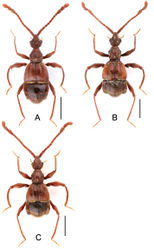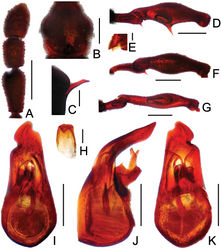Pselaphodes flexus
| Notice: | This page is derived from the original publication listed below, whose author(s) should always be credited. Further contributors may edit and improve the content of this page and, consequently, need to be credited as well (see page history). Any assessment of factual correctness requires a careful review of the original article as well as of subsequent contributions.
If you are uncertain whether your planned contribution is correct or not, we suggest that you use the associated discussion page instead of editing the page directly. This page should be cited as follows (rationale):
Citation formats to copy and paste
BibTeX: @article{Yin2012ZooKeys251, RIS/ Endnote: TY - JOUR Wikipedia/ Citizendium: <ref name="Yin2012ZooKeys251">{{Citation See also the citation download page at the journal. |
Ordo: Coleoptera
Familia: Staphylinidae
Genus: Pselaphodes
Name
Pselaphodes flexus Yin & Li sp. n. – Wikispecies link – ZooBank link – Pensoft Profile
Type material
(1 ♂, 7 ♀♀). Holotype: ♂, labeled ‘CHINA (N-Yunnan) Lijiang Naxi / Aut. Co., E Yulongxue Shan, / 30 km N Lijiang, 2800-2900 m / 25°09.0'N, 100°14.9'E (creek / valley, secondary mixed forest) / 13.VIII.2003 Wrase [01] // Sammlung / M. Schülke / Berlin // M. SCHÜLKE Coll. / Staphylinidae, Pselaphinae / Labomimus sp. 9 / S. Nomura det., 2005’ (cSch). Paratypes: 3 ♀♀, same label data as holotype, except ‘Labomimus sp. 7 / S. Nomura det., 2005’; 4 ♀♀, same label data, except ‘13.VIII.2003, M. Schülke, (cSch, SNUC).
Diagnosis
Reddish brown; length 2.87; postgenae rounded; antennomeres IX–XI enlarged, IX modified in the male; pronotum with lateral margins slightly angularly expanded laterally; with long metaventral processes apically narrowed; metacoxae simple; aedeagus with asymmetric median lobe.
Description
Male (Fig. 11C). Length 2.87. Head longer than wide, HL 0.66, HW 0.60; eyes each composed of about 25 facets. Antennal clubs as in Fig. 14A. Pronotum (Fig. 14B) about as long as wide, PL 0.65, PW 0.63, with lateral margins slightly angularly expanded laterally. Elytra wider than long, EL 0.81, EW 1.12. Long metaventral (Fig. 14C) processes narrowed apically. Protrochanters with small ventral spine, profemora with big sharp spine at ventral margin (Fig. 14D), protibiae with broad triangular spur (Fig. 14E); mesotrochanters with small spine at ventral margin, mesofemora simple (Fig. 14F); metatrochanters and metafemora (Fig. 14G) simple. Abdomen broad at base and narrowed apically, AL 0.75, AW 1.23. Sternite IX as in Fig. 14H. Aedeagus length 0.60, with asymmetric median lobe (Figs 14I–K).
Female. Unknown.
Comparative notes
As discussed above, this species may be related to Pselaphodes erlangshanus and Pselaphodes zhongdianus by sharing a similar general habitus, elongate antennomeres IX–XI, and a somewhat similar aedeagal form. Pselaphodes flexus can be separated from Pselaphodes erlangshanus by the smaller size, the mesotrochanters with single ventral spine, and much thinner metaventral process. The nearly symmetrically cylindrical antennomeres IX of Pselaphodes flexus readily separate it from Pselaphodes zhongdianus, whose antennomeres IX are strongly roundly and projecting anterolaterally.
Distribution
Southwest China: Yunnan.
Biology
The individual was sifted from a secondary mixed forest in a ravine.
Etymology
The Latin word ‘flexus’ means ‘curved, bent, twisting’, referring to the curved terminal antennomere of the new species.
Original Description
- Yin, Z; Li, L; 2012: Notes on Michael Schülke’s pselaphine collections from China. – Tyrini. I. genera Labomimus Sharp, Linan Hlaváč and Pselaphodes Westwood (Coleoptera, Staphylinidae, Pselaphinae) ZooKeys, 251: 83-118. doi
Images
|

